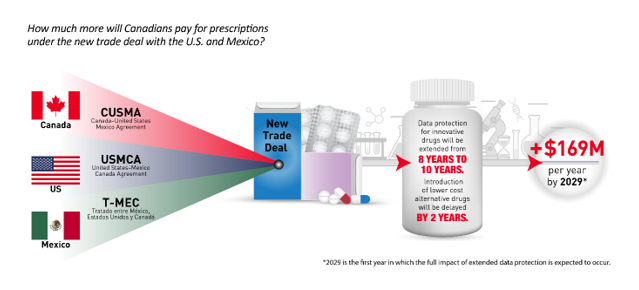PBO report shows that new NAFTA provisions threaten Pharmacare, says Council of Canadians

Council of Canadians | 2 April 2019
PBO report shows that new NAFTA provisions threaten Pharmacare, says Council of Canadians
Media Release
Ottawa – Today, the Parliamentary Budget Officer (PBO) revealed that new intellectual property provisions in the Canada-United States-Mexico Agreement (CUSMA) would cost Canadians as much as $169 million more per year for pharmaceutical drugs in the first year alone after they come into effect.
How much more CDNs pay for prescriptions under the new CUSMA
Source
The deal gives biologics, a new class of drugs made from human or animal tissue, two more years of data exclusivity. That would push back the release of less expensive biosimilars to 10 years.
Currently, progressive voices in the U.S. House of Representatives are pushing for the deal to be reopened to get rid of these provisions. The Council of Canadians is urging Canada to welcome these changes.
“CUSMA in its current form is a gift to big U.S. Pharma at the expense of people’s health. The provisions effectively deny patients life-saving treatments by pricing them out of reach. And these increased costs will put in peril a possible Pharmacare or national drug program,” said Maude Barlow, Honorary Chairperson of the Council of Canadians. “It is hypocritical to talk about ‘progressive trade’ when Canada is actively not willing to consider revisiting these provisions.”
Already, the PBO says that around 73 per cent of increases to Quebec’s public drug plan spending between 2010 and 2016 come from biologics. We can expect a federal Pharmacare program to be under additional financial pressures as more and more of these new drugs enter the market.
Canada has already agreed to extended drug patents or supplementary protection for pharmaceutical drugs in the Canada-European Comprehensive Economic and Trade Agreement (CETA). The PBO estimates those provisions cost Canadians $270 million a year.
“This shows that these trade deals are not even about free trade, but enhanced corporate rights,” said the Council’s Trade Campaigner Sujata Dey. “Our trade deals have a pattern of extending monopoly protectionist power to big lobbies and multinational companies. We are a long way from a truly fair trade agreement which would enrich us all while protecting people and the planet.”
For more information or to arrange interviews:
Dylan Penner, Media Officer, Council of Canadians, 613-795-8685, dpenner@canadians.org. Twitter: @CouncilOfCDNs





